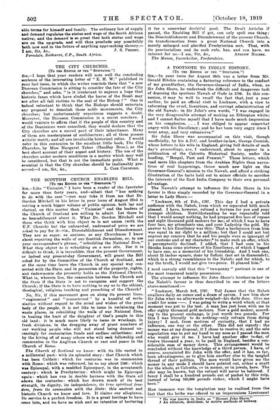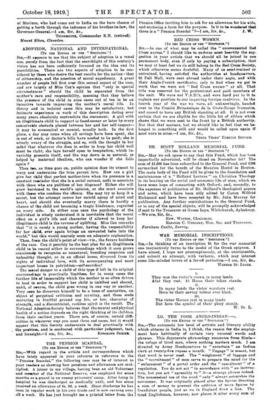A FOOTNOTE TO INDIAN HISTORY.
[To THE EDITOR OP THE " SPECTATOR.")
Sra,—In your issue for August 30th was a letter from Mr. Gerald Ritchie containing a flattering reference to the conduct of my grandfather, the Governor-General of India, when, as Sir John Shore, he undertook the difficult and dangerous task of deposing the spurious Nawab of Oude in 1798. In this connexion, it may he well to recall the fact that, just a year earlier, he paid an official visit to Lucknow, with a view to reforming the cruel, licentious, and corrupt administration of the old Nawab : in Sir John's own words, " I was engaged in the very disagreeable attempt of making an Ethiopian white; and I cannot flatter myself that I have made much impression on his complexion. . . . I was obliged to appear somewhat angry with his Excellency; and he has been very angry since I went away, and very submissive."
Sir John Shore was accompanied on this visit, though unofficially, by his A.D.C. and brother-in-law, George Cornish, whose letters to his wife in England, giving full details of each day's proceedings, are, I understand, about to appear in a publication of the Calcutta Historical Society, under the heading, " Bengal, Past and Present." These letters, which read more like chapters from the Arabian Nights than narra tives of real happenings, throw much new light on the Governor-General's .mission to the Nawab, and afford a striking illustration of the baits held out to minor officials to sacrifice the interests of the East India Company to their own personal advantage.
The Nawab's attempt to influence Sir John Shore in his favour is thus simply recorded by the Governor-General in a letter to Lady Shore :
"Lucknow, 8th of Feb., 1797. This day I had a private audience with the Nabob, from which we separated both much pleased. I have, however, refused a fortune for you and your younger children. Notwithstanding he was repeatedly told that I would accept nothing, he had prepared five lace of rupees and eight thousand gold mohnrs for me; of which I was to have four lace, my attendants one, and your Ladyship the gold. My answer to his Excellency was this : That a barleycorn from him was equal in my sight to a million; but that I could not but express my concern that he and his people were so ignorant of our customs and of my character,• to make such an offer, which I peremptorily declined. I added, that I had seen in his Murtha kens some pictures of his Excellency, of which I begged to have one, as a memorial of his friendship. And I took one, about 15 inches square, done by Zoffani (not set in diamonds-t), which is a strong resemblance to the Nabob; and for which, to say the truth, I would not give two-pence. It pleased him."
I need scarcely add that this " two-penny " portrait is one of the most treasured family possessions.
The attempt to influence Sir John Shore's brother-in-law in the Nabob's favour is thus described in one of the letters above-mentioned: " Lucknow, March 3rd, 1797. Tell James that the Nabob swallows daily an ounce and a dram of opium. I saw him show Sir John what we afterwards weighed—his daily dose. Give me credit for some I was going to write a word which at that moment was put to the test. A man has just been with me to offer eighty thousand gold mohurs. Now a gold mohur, according to the present exchange, is just worth two pounds. For this I was literally to do nothing—only refrain from doing injury! I said, from motives of curiosity, that I had no influence, one way or the other. This did not signify : the money was at my disposal, if I chose to receive it; and the sole negociation was to put my hand to my nose as I passed the men who would give it me. I have had another offer to-day, of twelve thousand a year, to be paid in England, besides a considerable sum of money down. This arrangement would be concluded without the knowledge of a third person. I have, of course, acquainted Sir John with the offer, and it has, so far, been advantageous, as to give him another clue to the tangled thread of their politics. The man would have given me the money in any mode I should have pointed out, either a draft for the whole, at Calcutta, or in money, or in jewels, here. The offer may be known, but the refusal will never be believed. I fancy I shall be a hundred pounds out of pocket by this trip, instead of being 160,000 pounds richer, which I might have been."
How immense was the temptation may be realized from the fact that tha bribe was offered town impecunious Lieutenant • He was known in India as "Honest John Shore." .t An allusion, doubtless, to native methods of bribery. of Marines, who had come out to India on the bare chance of getting a berth through the influence of his brother-in-law, the Governor-General.-1 am, Sir, do., Tsioestourn, Commander R.N. (retired). Mount Elton, Clevedon.
ADOPTION, NATIONAL AND INTERNATIONAL. (To THE ED/TOR or THE " SPECTATOR.") Sia,—It appears to me that the subject of adoption is a vexed one, purely from the fact that the searchlight of this century's vision has not been sufficiently focussed on the idea and its possibilities. There are two aspects of adoption to be considered by those who desire the best results for the nation—that of citizenship, and the question of moral expediency. A great number of people fall first over this second aspect of the case, and are largely of Miss Cox's opinion that "only in special circumstances " should the child be separated from the mother's care and responsibility, meaning that they believe the presence of the child in nine cases out of ten to be an incentive towards improving the mother's moral life. In theory and in isolated cases this may be satisfactory, but intimate experience in work of this description dating over many years absolutely contradicts the statement. A girl with an illegitimate child to support is faced sooner or later by every conceivable obstacle placed between her and her self-respect— it may be economical or mental, usually both. In the first place, a day may come when all savings have been spent, she is out of work, or doctor's bills have needed to be paid; she is utterly weary of the struggle, and so, with the thought in her mind that whatever she does in order to keep her child well must be right, she lays herself open to temptation, which invariably presents itself, and the way down is so natural, so helped by maternal idealism, who can wonder if she falls again P Then too, as time goes on, public opinion does its utmost to warp and undermine the true parent love. How can a girl give her child that perfect mother-love when its presence is a constant reminder that she is a social outcast, unfit to associate with those who are guiltless of her disgrace? Either she will grow hardened to the world's opinion, or she must associate with these who condone the offence. She may try to keep it a secret, but the attempt causes her untold agony of mind and heart, and should she eventually marry there is hardly a chance of the child not becoming a tragic hindrance, regretted on every side. In either case once the psychology of the individual is wisely understood it is inevitable that the moral effect on a girl's life and character if allowed to keep her illegitimate child is the reverse of uplifting. Miss Cox remarks that " it is rarely a young mother, having the responsibility for her child, ever again brings an unwanted babe into the world," but this would scarcely seem an adequate explanation.
Then, from the child's point of view—viz., the future builders of the race. Can it possibly be the best plan for an illegitimate child to be reared either in surroundings which it soon grows consciously to recognize as unnatural, breeding suspicion and unhealthy thought, or in an official home, divorced from its rights of individual love, with its accompanying and most important lesson in patriotism—self-sacrifice?
The moral danger to a child of this type if left in its original surroundings is practically limitless, for in many cases the further life of immorality which the mother is so often driven to lead in order to support her child is imbibed and shared, until, of course, the child goes wrong in one way or another. Very soon he discovers himself to be a bone of contention, an object 9f perpetual criticism and scrutiny, and these seeds maturing in fruitful ground sap his, or her, character of strength, and a discontented, reckless spirit is the result. The National Adoption Society believes that the mental and physical health of a nation depends on the right thinking of its children from their earliest years. There are, of course, untold difficulties in whatever way you meet these sad cases, but it would appear that this Society endeavours to deal practically with the problem, and is conducted with particular judgment, tact, and foresight.—I am, Sir, dm., ROSAMOND SKEIN&







































 Previous page
Previous page